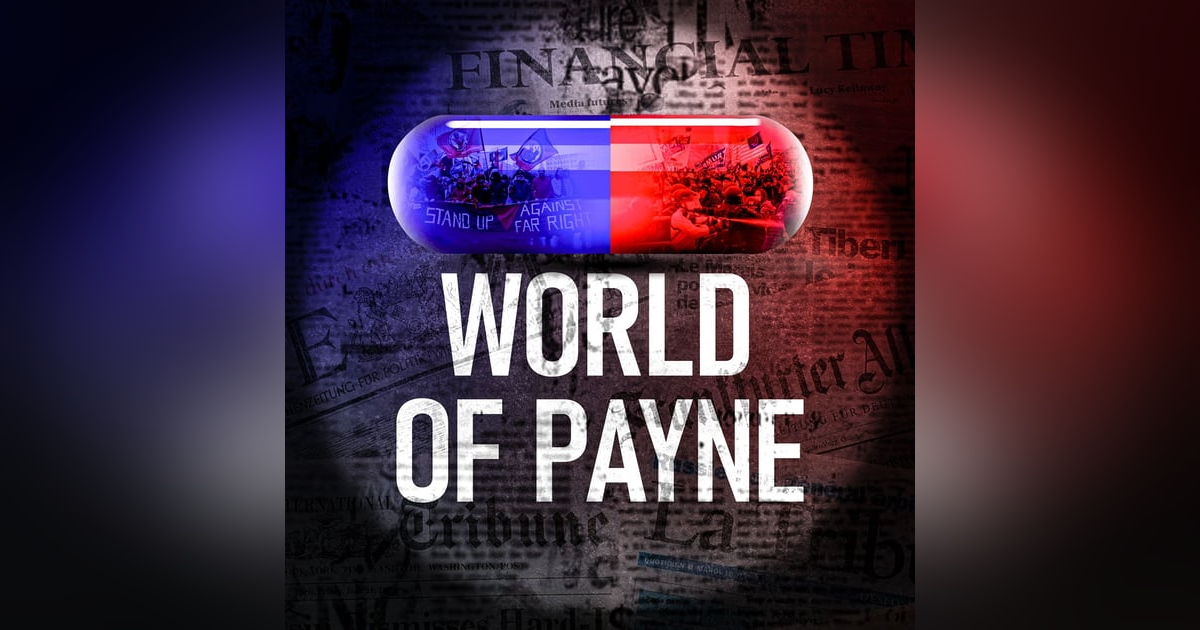Federal Intervention in Portland: A Conservative View on Law, Order, and Sovereignty
The summer of 2020 witnessed a series of events in Portland, Oregon, that ignited a national debate about the role of government, the limits of protest, and the very definition of justice. As protests raged, federal intervention became a flashpoint, drawing scrutiny from all sides of the political spectrum. This blog post aims to analyze the federal intervention in Portland through a conservative lens, focusing on the importance of law and order, the protection of property, and the preservation of American sovereignty. We will explore the conservative perspective on the role of government in maintaining peace and security while also addressing concerns about federal overreach and potential abuses of power. We'll also examine the counter-narrative from the left and how a path towards unity can be built on conversation. This post serves as an extension to the themes explored in the latest episode of the World of Payne Podcast, Power, Policy, and Pushback: A Conservative Look at the Battle for America’s Balance, where we dissected these events and their broader implications for American society.
Introduction: Setting the Stage in Portland
In the wake of George Floyd’s death in May 2020, protests erupted across the United States, including in Portland. What began as peaceful demonstrations against police brutality soon devolved into nightly clashes between protesters and law enforcement. Federal buildings, including the Mark O. Hatfield U.S. Courthouse, became focal points for unrest, with repeated acts of vandalism, arson, and violence directed at federal property. In response, the Trump administration deployed federal agents to Portland to protect federal assets and restore order. This decision was immediately met with fierce opposition from local and state officials, who accused the federal government of overreach and escalating tensions. The situation in Portland became a microcosm of the broader cultural and political divisions plaguing the nation, with deeply entrenched narratives clashing over issues of justice, power, and authority. This sets the stage for a much deeper dive into the conservative principles that guide our understanding of these events.
The Conservative View: Law and Order as Foundational Principles
At the heart of the conservative worldview lies a deep respect for law and order. Conservatives believe that a stable and well-ordered society is essential for individual liberty and economic prosperity. Law and order provide the framework within which individuals can pursue their goals, accumulate wealth, and raise families in safety and security. Without a strong legal system and effective law enforcement, society risks descending into chaos and anarchy, where the rights of individuals are trampled upon and the rule of the mob prevails. From a conservative perspective, the breakdown of law and order in Portland posed a direct threat to the principles upon which American society is founded. The nightly riots, the destruction of property, and the attacks on law enforcement were seen as an affront to the rule of law and a challenge to the very foundations of civil society. Therefore, conservatives generally supported efforts to restore order and protect federal property, even if it meant deploying federal resources.
Protecting Property: A Cornerstone of American Society
The protection of private property is another fundamental principle of conservative thought. Conservatives believe that the right to own and control property is essential for individual freedom and economic prosperity. Property rights provide individuals with the incentive to work hard, save, and invest, knowing that they will be able to enjoy the fruits of their labor. Moreover, property rights are a safeguard against government tyranny, as they limit the power of the state to confiscate or control private assets. In the context of the Portland protests, the destruction of property became a major point of concern for conservatives. The repeated acts of vandalism, arson, and looting were seen as a direct assault on the property rights of businesses and individuals. Conservatives argued that the government has a responsibility to protect property rights, even if it means using force to quell unrest and deter criminal activity. This protection, they asserted, is not just about the physical structures but also about upholding the principles of a free and just society.
Federal Intervention: Balancing Authority and Accountability
The decision to deploy federal agents to Portland was a complex one, fraught with legal and political considerations. Conservatives generally support the idea of federal intervention when state and local authorities are unable or unwilling to maintain law and order. The Constitution grants the federal government the power to protect federal property and enforce federal laws, and conservatives believe that the government has a duty to exercise this power when necessary. However, conservatives also recognize the importance of limiting federal power and respecting the autonomy of state and local governments. They are wary of federal overreach and believe that the federal government should only intervene in situations where there is a clear and compelling need. In the case of Portland, conservatives debated whether the situation warranted federal intervention. Some argued that the violence and destruction had reached a point where federal intervention was necessary to protect federal property and restore order. Others expressed concerns about the potential for federal overreach and the impact on civil liberties. Ultimately, most conservatives supported the federal intervention in Portland, but they also emphasized the importance of holding federal agents accountable for their actions and ensuring that they operate within the bounds of the law.
The Left's Narrative: A Counterpoint
Understanding the conservative perspective on the federal intervention in Portland requires acknowledging the counter-narrative advanced by the left. The left generally viewed the federal intervention as an act of aggression against peaceful protesters and an abuse of federal power. They argued that the federal agents were heavy-handed and used excessive force against protesters, violating their constitutional rights. They also criticized the Trump administration for using Portland as a political prop, seeking to stoke fear and division for political gain. From the left's perspective, the protests in Portland were a legitimate expression of outrage against police brutality and racial injustice. They argued that the protesters were exercising their First Amendment rights to assemble and protest, and that the government had no right to suppress their voices. Moreover, they contended that the focus on property damage was a distraction from the underlying issues of systemic racism and inequality that the protests were meant to address. This divergence in perspectives highlights the deep ideological divides that shaped the debate over the federal intervention in Portland.
Concerns About Federal Overreach: Safeguarding Liberty
Despite their support for law and order and the protection of property, conservatives also harbor concerns about federal overreach. They believe that the federal government should be limited in its power and that individual liberties should be protected from government intrusion. Conservatives are particularly wary of the potential for the federal government to abuse its power in the name of security or order. They argue that history is replete with examples of governments that have used emergency powers to suppress dissent and violate the rights of their citizens. In the context of the Portland protests, conservatives raised concerns about the tactics used by federal agents, including the use of unmarked vehicles to detain protesters and the deployment of tear gas and other crowd control measures. They argued that these tactics raised serious questions about due process and the protection of civil liberties. Even while supporting the intervention, conservatives emphasized the importance of transparency and accountability, calling for investigations into any allegations of misconduct by federal agents. The goal is to strike a balance between maintaining order and safeguarding the fundamental rights of citizens.
American Sovereignty: Defending Our Borders and Values
The concept of American sovereignty is deeply rooted in conservative thought. Conservatives believe that the United States has the right to control its borders, enforce its laws, and defend its values. They see the preservation of American sovereignty as essential for the nation's security, prosperity, and cultural identity. In the context of the Portland protests, some conservatives argued that the unrest posed a threat to American sovereignty. They pointed to the presence of anarchist and anti-government groups among the protesters, who they claimed were seeking to undermine the foundations of American society. They also expressed concern about the influence of foreign actors, who they alleged were seeking to destabilize the United States through social unrest and political division. While these claims were often unsubstantiated, they reflected a broader conservative anxiety about the erosion of American sovereignty in a globalized world. The defense of American sovereignty, in this view, requires not only securing the physical borders but also protecting the nation's values and institutions from internal and external threats.
The Role of Government: Maintaining Peace and Security
The conservative view on the role of government is that it should primarily focus on maintaining peace and security, protecting individual rights, and promoting economic prosperity. Conservatives believe that government should be limited in its scope and power, and that individuals and businesses should be free to make their own decisions without undue government interference. However, conservatives also recognize that government has a legitimate role to play in maintaining order and protecting its citizens from harm. This includes enforcing laws, providing for national defense, and ensuring that basic public services are available to all. In the context of the Portland protests, conservatives argued that the government had a responsibility to restore order and protect federal property, even if it meant using force. They believed that the failure to do so would embolden lawbreakers and undermine the rule of law. At the same time, conservatives emphasized the importance of respecting individual rights and ensuring that government actions are consistent with the Constitution. The challenge lies in finding the right balance between government authority and individual liberty, a balance that is essential for a free and prosperous society.
Unity Through Conversation: A Path Forward
Despite the deep divisions that characterized the debate over the federal intervention in Portland, conservatives believe that unity is still possible. However, unity requires honest and respectful conversation, a willingness to listen to opposing viewpoints, and a commitment to finding common ground. Conservatives argue that the left and the right need to move beyond their ideological silos and engage in constructive dialogue about the challenges facing the nation. This includes addressing issues of racial injustice, economic inequality, and political polarization. It also means finding ways to bridge the cultural divide that separates urban and rural communities, coastal and heartland states, and different ethnic and religious groups. Conservatives believe that the key to unity lies in a shared commitment to the principles of freedom, equality, and opportunity for all. By working together, Americans can overcome their differences and build a more just and prosperous society for future generations. This approach is central to the World of Payne Podcast and its mission to foster understanding and collaboration across the political spectrum.
Conclusion: A Conservative Vision for Portland and Beyond
The federal intervention in Portland was a complex and controversial event that raised fundamental questions about the role of government, the limits of protest, and the preservation of American values. From a conservative perspective, the intervention was justified as a necessary step to restore order, protect property, and defend American sovereignty. However, conservatives also recognized the importance of limiting federal power and safeguarding individual liberties. Ultimately, the events in Portland serve as a reminder of the deep divisions that plague American society and the urgent need for unity and reconciliation. By engaging in honest and respectful conversation, Americans can find common ground and build a more just and prosperous future for all. This aligns with the broader themes explored in the World of Payne Podcast episode, Power, Policy, and Pushback: A Conservative Look at the Battle for America’s Balance, where we examine the challenges and opportunities facing America through a conservative lens. The podcast serves as a platform for exploring these complex issues and fostering a deeper understanding of the conservative perspective.



